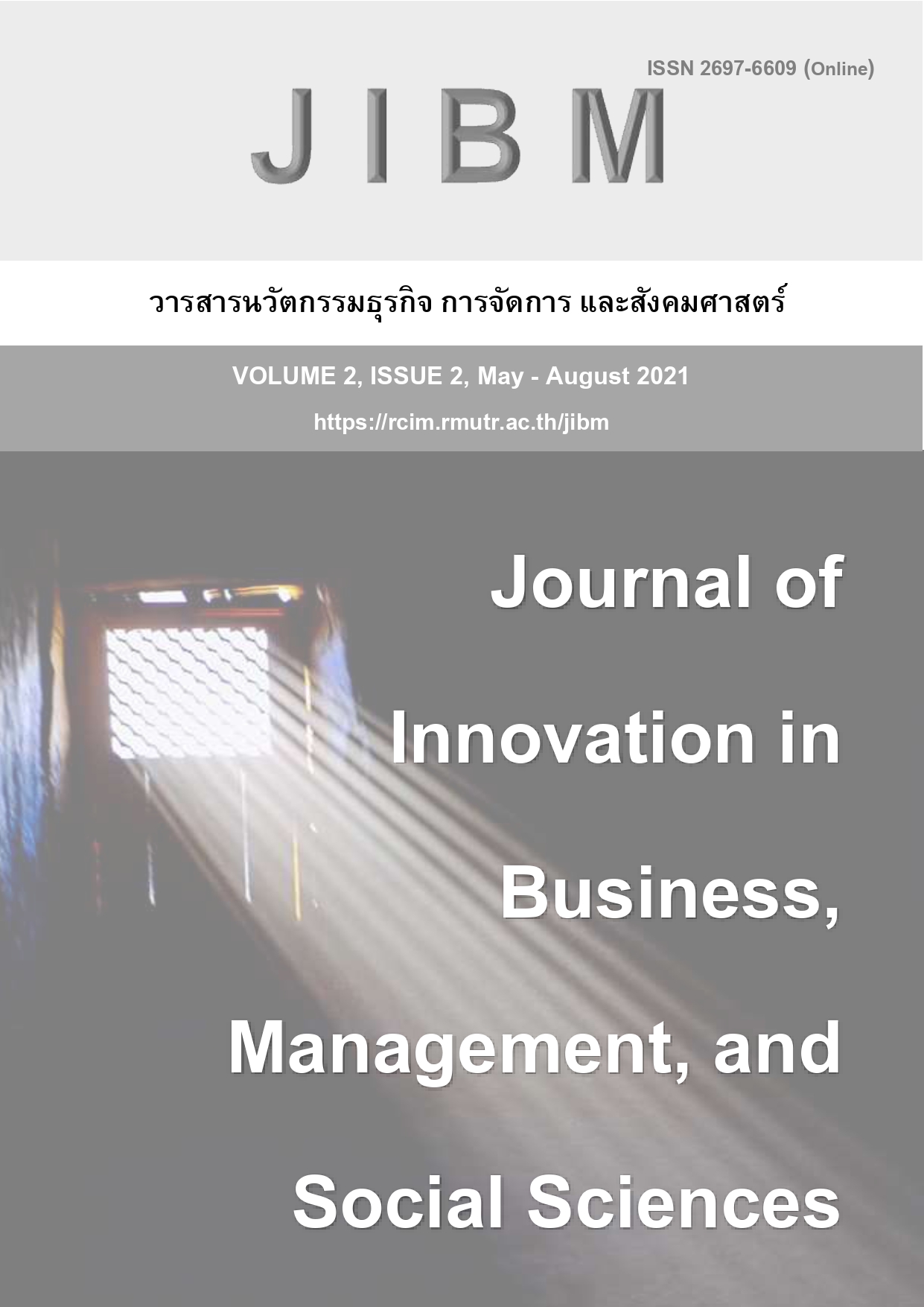อิทธิพลของการบริหารลูกค้าสัมพันธ์ (CRM) ที่ส่งผลต่อ ผลการปฏิบัติงานขององค์กร กรณีศึกษา ธนาคารพาณิชย์ในประเทศไทย
Keywords:
Customer Relationship Management, Financial Performance, Customer Performance, Learning and Growth Performance, Internal Process PerformanceAbstract
The objective of this research is to study customer relationship management factors affecting organizational performance including financial performance, customer performance, internal process performance, and learning and growth performance. The data was collected by online questionnaire with 300 samples who are staff in banking businesses and related to customer relationship management. Then the data was analyzed by multiple regression technique. The finding reveals that the significant value of four organizational performance are lower than 0.05. In addition, the hypotheses testing showed that customer relationship factors have positive effect on financial performance, customer performance, and learning and growth performance whereas customer relationship factors have negative effect on internal process performance. This research is useful for banks to provide customers with the highest satisfaction and impressive service.
References
Abdullateef, A.O., Mokhtar, S.S., & Yusoff, R.Z. (2010). The impact of CRM dimensions on call center performance. International Journal of Computer Science and Network Security, 10 (12), 184-195.
Anonymous. (2006). Non-Financial data can predict future profitability. Business Credit, 108 (4), 57.
Ashton, C. (1998). Balanced scorecard benefits Nat West Bank. International Journal of Retail and Distribution Management, 26 (10), 400-407.
Asikhia, O. (2010). Customer orientation and firm performance among Nigerian small andmedium scale businesses. International Journal of Marketing Studies, 2 (1), 197-213.
Croteau, A. M., & Li, P. (2003). Critical success factors of CRM technological initiatives. Canadian Journal of Administrative Sciences, 20 (1), 21-34.
Davis, S., & Albright, T. (2004). An investigation of the effect of the balanced scorecard implementation on financial Performance. Management Accounting Research, 15 (2), 135-153.
Dowling, J. (1993). Organizational legitimacy: social values and organizational behavior. Pacific Sociological Review, 18 (10), 122-136.
Kaplan, R.S., & Norton, D.P. (1992). The balanced scorecard: measures that drive performance. Harvard Business Review, 1 (2), 71-79.
Kim, C.S., & Davidson, L.F. (2004). The effects of IT expenditures on bank' business Performance: Using a balance scorecard approach. Managerial finance, 30 (6), 28-45.
Kotler, P., & Armstrong, G. (2013). Marketing: An Introduction (3rd ed.). USA: Prentice Hall.
Leung, L.C., Lam, K.C.K., & Cao, D. (2006). Implementing the balanced scorecard using the analytic hierarchy process and the analytic network process. Journal of the Operational Research Society, 57 (6), 682-691.
Liu, S.S., Luo, X., & Shi, Y. (2003). Market oriented organizations in an emerging economy: a study of the missing links. Journal of Business Research, 56 (6), 481-491.
Mouritsen, L., Thorsgaard, L.H., & Bukh, P.N. (2005). Dealing with the knowledge economy: Intellectual capital versus balance scorecard. Journal of Intellectual Capital, 6 (1), 8-27.
Payne, A., & Frow, P. (2005). A Strategic Framework for Customer Relationship Management. Journal of Marketing, 69 (11), 167-176.
Randolph, W.A., & Dess, G.G. (1984). The congruence of perspective of organizational design: a conceptual model and multivariate research approach. Academy of Marketing Review, 9 (1), 114-127.
Shi, J., & Yip, L. (2007). Driving innovation and improving employee capability: the effects of customer knowledge sharing on CRM. The Business Review, 7 (1), 107-112.
Sin, L.Y.M., Tse, A.C.B., & Yim, F.H.K. (2005). CRM: conceptualization and scale development. European Journal of Marketing, 39 (11), 1264-1290.
Tajeddini, K. (2010). Effect of customer orientation and entrepreneurial orientation on innovativeness: evidence from the hotel industry in Switzerland. Tourism Management, 31 (2), 221-231.
Wu, S.I., & Hung, J.M. (2007). The Performance measurement of cause-related marketing by balance scorecard. Total Quality Management, 18 (7), 771-791.
Wu, S.I., & Lu, C. (2012). The relationship between CRM, RM, and business Performance: A study of the hotel industry in Taiwan. International Journal of Hospitality Management, 31 (1), 276-285.
Yueh, C.L., Lee, Y., & Barnes, F.B, (2010). The effects of leadership styles on knowledge-based customer relationship management implementation. International Journal of Management and Marketing Research, 3 (1), 1-19.



